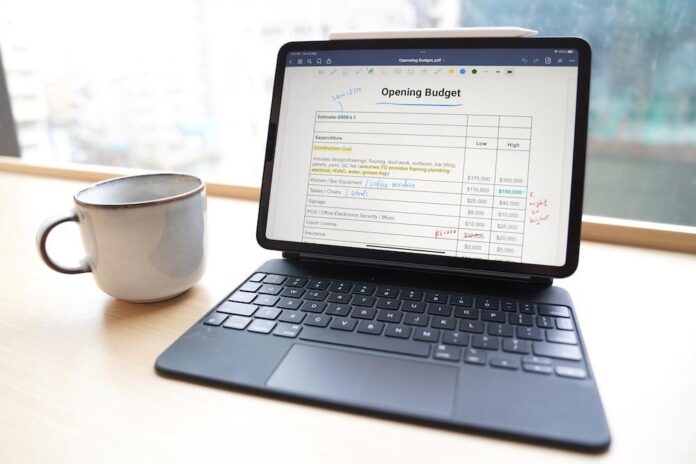Tracking one’s income sounds simple, but it’s tricky when you think about how frequently money is used. Applying a system to manage your income can feel like a lot to get used to.
Still, once you get acquainted with a reliable method, you’ll find a tracking approach to be a significant tool for your financial management.
To get started, here’s insight on how to smartly track your income.
Table of Contents
How To Keep Track Of Your Income In Smart Ways
#1 Work With An Advisor
Everyone can benefit from working with a financial mentor or financial advisor. These professionals know the best strategies for managing income and wealth and can give you some methods to improve your financial situation.
Tracking your income is undoubtedly part of this process, so having a conversation with an advisor or financial mentor can give you some direction that you may need to move forward.
Not all financial advisors are costly; you may even know someone who can serve as an excellent financial mentor in your community. There are also a ton of seminars and apps that can be utilized to gain financial advice from these experts at an affordable cost.
However, if you need help with specific financial products, such as Maryland bank statement loans, reaching out to a financial team is the best course of action.
#2 Identify Your Goals
Your financial situation aligns itself naturally with specific goals already. You can tell immediately if you’re doing well or falling behind. With your general knowledge about your financial situation, get ahead of it by identifying your goals.
You want to avoid reaching for the stars when you first get situated. As with all plans, you must keep things reasonable because getting from A to Z may take time.
So, if you are trying to build your wealth but have $3,000 in debt, you want to pay back that money first before you start working on saving for the future. With finances, there is just an order of operations to things. Identifying your financial goals can give you a better idea of your priorities.
#3 Monitor Your Money
Keep a budgeting system in place so you can always monitor your money. By knowing what you spend in a day, the amount of money that is coming in for a given period (and you can time this as you see fit, i.e., your income per week, every two weeks, per month, etc.), you can make smarter decisions about where your money is going.
You can only keep track of the numbers if you’re measuring your finances. It is far too easy to lose track of your income when your ability to monitor your finances needs to improve.
Staying consistent with your monitoring will give you the details you need to make better financial decisions in the future.
#4 Use Automation When You Can
While a manual budgeting system is acceptable, you may wish to see how your finances look when projected over time. However, this can be difficult for the average person to estimate. You can check out The Real World Tate for helpful resources on tracking your finances.
Unless you’re a master mathematician, using an app can give you the tools you need to see graphs, charts, and so on of your income over extended periods. Something you can refer to can make a huge difference, and you don’t need to worry about calculation errors with automated assistance.
How To Keep Track Of Your Income In Smart Ways: FAQs
Knowing where your money goes is the first step to taking control of your finances. Here are some answers to frequently asked questions about smart income tracking:
How do you keep track of your money?
There are several methods for tracking your income:
- Pen and Paper: The traditional method. Use a notebook to record your income sources, amounts, and expenses. This can be a good option for those who prefer a hands-on approach.
- Spreadsheets: Create a spreadsheet on your computer to categorize your income and expenses. Spreadsheets offer more flexibility and allow for calculations and basic data analysis.
- Budgeting Apps: Numerous budgeting apps are available for smartphones and computers. These apps can automatically import transactions from your bank accounts, categorize your spending, and provide insights into your financial habits. Some popular options include Mint, YNAB (You Need A Budget), and Personal Capital.
READ ALSO: Managing Resources for Business Growth: How to Optimize Your Finances and Personnel
What is the best way to track personal finances?
The best way depends on your personal preferences and lifestyle. Here’s a breakdown to help you decide:
- Pen and Paper: Good for those who prefer a simple, low-tech approach. It can be time-consuming to maintain and lacks features for data analysis.
- Spreadsheets: Offer more flexibility and customization than pen and paper. It can be more time-consuming to set up and maintain compared to budgeting apps.
- Budgeting Apps: Generally the most convenient and user-friendly option. Features like automatic transaction import and expense categorization save time. However, some budgeting apps may require a subscription fee.
What is the best way to manage your income?
Here are some smart ways to manage your income:
- Track Your Income Regularly: Regardless of the method you choose, record your income consistently. Depending on your income frequency, this could be daily, weekly, or monthly.
- Set Up a Budget: Once you have a clear picture of your income, create a budget to allocate funds for expenses, savings, and debt repayment. Various budgeting methods like the 50/30/20 rule (50% needs, 30% wants, 20% savings/debt repayment) help you get started.
- Automate Savings: Consider setting up automatic transfers from your checking account to your savings account. This ensures a consistent and effortless approach to saving money.
- Review Regularly: Don’t set your budget and forget it. Regularly review your income and expenses to see if adjustments are needed. Your financial goals and circumstances might change over time, so it’s crucial to adapt your budget accordingly.
How do I start tracking money?
Here are some steps to get you started with income tracking:
- Choose a Method: Decide whether you prefer pen and paper, spreadsheets, or budgeting apps.
- Gather Information: Collect your bank statements, pay stubs, or other documents detailing your income sources and amounts.
- Start Recording: Begin recording your income consistently using your chosen method.
- Categorize: Classify your income sources (salary, freelance work, etc.) for better organization and analysis.
What is the app that helps you track your money?
Many budgeting apps are available, each with its strengths and features. Here are a few popular options:
- Mint: A free app that offers automatic transaction import, budgeting tools, and financial goal setting.
- YNAB (You Need A Budget): A subscription-based app with a unique budgeting method focused on assigning every dollar to a specific category.
- Personal Capital: A free app that provides a comprehensive view of your finances, including income tracking, budgeting, net worth tracking, and investment management tools.
READ ALSO: 5 Reasons Why You Should Go Cashless Now
How do I manage my bills and money?
Here are some tips for managing your bills and money effectively:
- Pay Bills on Time: Avoid late fees and potential damage to your credit score by paying bills on time. Consider setting up automatic payments for recurring bills.
- Prioritize Needs Over Wants: Distinguish between essential expenses (rent, utilities, groceries) and discretionary spending (entertainment, dining out). Ensure your basic needs are covered before allocating funds for wants.
- Reduce Expenses: Look for areas where you can reduce spending, such as eating out less often or cancelling unused subscriptions.
- Build an Emergency Fund: Aim to save enough money to cover unexpected expenses, such as car repairs or medical bills. A standard recommendation is to save 3-6 months of living expenses.
By keeping track of your income and implementing innovative management strategies, you can take control of your finances and achieve your financial goals.
The Bottom Line
Track your income this year by tracking your expenses, monitoring your money, utilizing a budget, and working with a financial team.
With these tools, you can learn how to narrow down your financial goals and utilize strategies to achieve them. With a bit of work, you can find an approach to tracking your income that works for you.
INTERESTING POSTS
- How To Calculate Your Short-Term Vacation Rental Cash Flow
- How To Measure SEO Success: KPIs You Need To Track
- How To Stay Ahead During The Slow Season
- Why Is Cybersecurity In Financial Services Important?
- 6 Ways To Secure Your Home Construction Site
- How A PDF Can Contain Malware
- 7 Business Credit Card Tips For Small Businesses
About the Author:
Mikkelsen Holm is an M.Sc. Cybersecurity graduate with over six years of experience in writing cybersecurity news, reviews, and tutorials. He is passionate about helping individuals and organizations protect their digital assets, and is a regular contributor to various cybersecurity publications. He is an advocate for the adoption of best practices in the field of cybersecurity and has a deep understanding of the industry.
Meet Angela Daniel, an esteemed cybersecurity expert and the Associate Editor at SecureBlitz. With a profound understanding of the digital security landscape, Angela is dedicated to sharing her wealth of knowledge with readers. Her insightful articles delve into the intricacies of cybersecurity, offering a beacon of understanding in the ever-evolving realm of online safety.
Angela's expertise is grounded in a passion for staying at the forefront of emerging threats and protective measures. Her commitment to empowering individuals and organizations with the tools and insights to safeguard their digital presence is unwavering.







